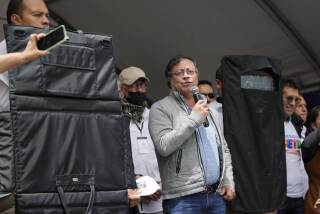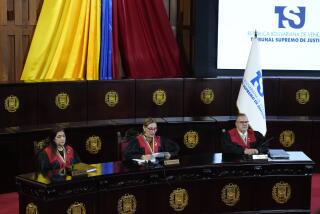Peru Rejects Appeals, Proceeds With Sunday Vote
- Share via
LIMA, Peru — Election officials Thursday rejected fervent appeals from Peruvians and foreign diplomats to postpone a presidential election clouded by suspicion and protest, declaring that the vote will go forward Sunday as scheduled.
The announcement means that President Alberto Fujimori will almost certainly be reelected to an unprecedented third term. His challenger, Alejandro Toledo, withdrew his candidacy this week, demanding that the government postpone the election to June 18 as urged by Latin American election monitors who wanted more time to safeguard against fraud.
The decision stunned monitors representing the Organization of American States, who felt that they were close to a compromise after days of intense negotiations involving Latin American, U.S. and European diplomats.
Later Thursday, the OAS mission said it would not participate in ground monitoring of Sunday’s election, further casting doubt on the legitimacy of the Fujimori regime and democracy in Peru.
The mission said in a statement that it would maintain a core team to issue a final report after the election.
Meanwhile, thousands of angry students and workers shouted insults and threw rocks at the presidential palace until police fired tear gas to disperse them. Toledo condemned Fujimori for risking domestic strife and diplomatic isolation by going ahead with a one-man election.
“I lament enormously the persistent failure to find a way out of an issue that could push Peru into a scenario of greater instability and political and economic consequences,” Toledo said.
Fujimori’s intransigence has pushed Peru into a volatile period with broad implications for a troubled Andean region, where democracies are threatened by authoritarianism, economic crisis and lawlessness.
Peru’s problems go beyond the failure to postpone the election, Fujimori’s opponents say. The president’s very candidacy is in question because many Peruvians say a third presidential term is unconstitutional. The tumultuous campaign--in which the government was accused of manipulating the media, using state resources on the president’s behalf and harassing opponents--contributed to the impression that Fujimori has consolidated an authoritarian regime.
“I think Fujimori will weather the storm,” said David Scott Palmer, a Boston University professor and Peru expert. “But I think he underestimates the intensity of feeling about the way he has run roughshod over democratic norms.”
Peruvians and diplomats alike say Toledo’s impetuous and contradictory statements have made negotiations more difficult. Election observers were dismayed at the challenger’s recent insistence on a June 18 election after he had agreed to June 11 in a private meeting with the OAS mission chief, one OAS official said.
The national elections board issued a statement Thursday saying the vote would go forward because a test had shown that the computerized vote-counting system was working well. The OAS had said earlier in the day that its experts needed at least 10 more days to evaluate the computer system.
Voting is mandatory in Peru, so Toledo supporters plan to write “no to fraud” on their ballots and step up a campaign of civil disobedience.
Rotella reported from Buenos Aires and Tarnawiecki from Lima.
More to Read
Sign up for Essential California
The most important California stories and recommendations in your inbox every morning.
You may occasionally receive promotional content from the Los Angeles Times.













